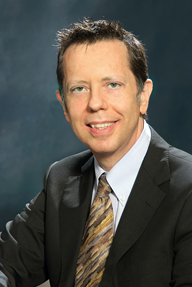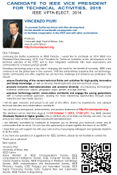Qualifications
Vincenzo Piuri is in his 30th year of continuous and active service in IEEE, first as a student, more recently as Society President and member of the IEEE Board of Directors. He has been actively involved in many aspects and at many levels within IEEE activities and operations, including conferences, publications, education, member activities, finances, and management. Specifically, he:
- chaired, co-founded, or promoted foundation of several technical committees (e.g., in CIS, CS, IMS, SYSC, BIOMC), and supported restructuring of technical activities in various Societies/Councils for higher efficiency and effectiveness;
- organized successful large conferences (e.g., iThings 2013, SSCI 2009, IMTC 2010 / 2009 / 2004, IJCNN 2010 / 2009 / 2000), and created CIVEMSA/CIMSA (now in the eleventh year);
- served as Editor-in-Chief (ISJ) and Associate Editor (T-NN, T-IM, CI-M), nurtured new publications (e.g., CI-M, T-AMD, T-CIAIG), and promoted development of existing journals (T-IM, T-NN, T-FS, T-EC, ISJ) to also address industry needs;
- created and developed educational activities (e.g., summer schools, tutorials at conferences, on-line, and in the IEEE e-Learning Library);
- promoted outreach to various technology-centric communities, facilitated creation of over 30 Chapters worldwide, chaired Chapters and a Student Branch, nominated Senior Members and Fellows, and proposed new awards;
- served on many boards and committees (e.g., IEEE Board of Directors, Technical Activities Board, Strategic Planning Committees of TAB and PSPB), was Society President, served as Vice President (Publications, Members Activities, Education) and Administrative Committee Member of Societies/Councils, and cooperated in organizing or re-structuring Societies/Councils.
In these activities he has always sought deep understanding of problems while contributing to the development of strategies for solutions and implementations and building consensus that resulted in effective outcomes and results.
His understanding of the technical issues and the variegated needs for technical forums, activities, products and services for researchers, professionals, students, and government agencies are based on his education (Ph.D. degree in computer engineering), his research activity in interdisciplinary technological areas, his service to the academy (director of a computer science department, director of a Ph.D. degree program in information and communication technologies and related applications, international collaborations in developing joint Ph.D. degree programs, manager of national/international research projects), and -mainly- in his service for various IEEE Societies and Councils.
In all of these years of service to the IEEE Vincenzo Piuri acquired therefore a solid and broad understanding of its structure and operation, including technical, products, services, management, and financial aspects.
He always considered any new problem as a challenge, an opportunity to learn from more experienced people, a chance for fruitfully interacting with volunteers and staff to address issues all together, and a gift to allow him to serve in fulfilling the mission of the IEEE for the benefit of humanity, caring only for the good of the technology-centric communities worldwide.
Even though he liked to have his hands on the various activities, to have a deep understanding of the problems, and to get the underlying causes and motivations, he tried to have a strategic perspective guiding his actions and to build as much consensus so that collaborative operations were highly effective in the international scenario, focusing on outcomes and results.
Vincenzo Piuri was always inspired by all previous experiences, in a continuity of purpose and vision, adhering to the mission and the core values of the IEEE at the service of the scientific and professional communities worldwide, while working hard to fostering the advancement of science, technology, and profession. He has in fact a natural aspiration toward progress, gradually implementing changes so as to avoid too abrupt perturbations, favoring incremental developments for more consensus and confidence in the outcomes and for more readiness in detecting and correcting undesired evolutions.
He also has really valued, respected and cared for all diversities (e.g., in opinion, culture, technological expertise, profession, geographic origin, gender, age) since they are the true richness not only of the IEEE, but of any community. It is in fact from the discussion and comparison of different points of view that the best solutions are generated and developed. It is from constructive criticisms that problems and issues are overcome together for the benefit of all. It is from engaging everybody, especially the young generations, that we grow all together and create the foundations for our future.
Organizational and managerial skills, program management, ability of effectively delegating, effectiveness in dealing with difficult situations and conflicts, care for motivating and rewarding people for implementing the strategic vision, coherence to the strategic vision shared by the community, and ability of helping a community to identify a common strategic vision and a practical implementation plan have been developed and refined with the same attitude shown in the IEEE also in the daily job as director of an advanced computing center, university professor, department director, Ph.D. degree program director, and member of several academic committees. The attention to diversity and the transnational perspective have been nurtured, on his natural sensitivity, by the variety of contacts and collaborations worldwide.



















